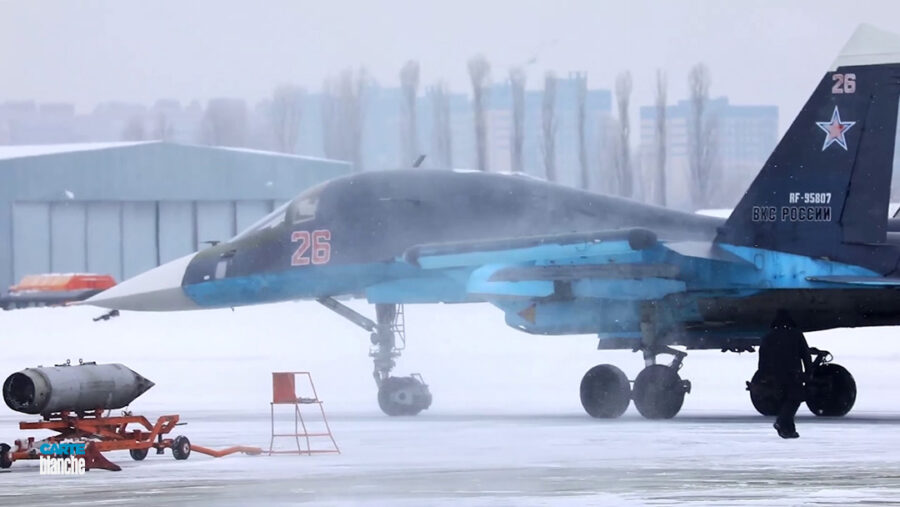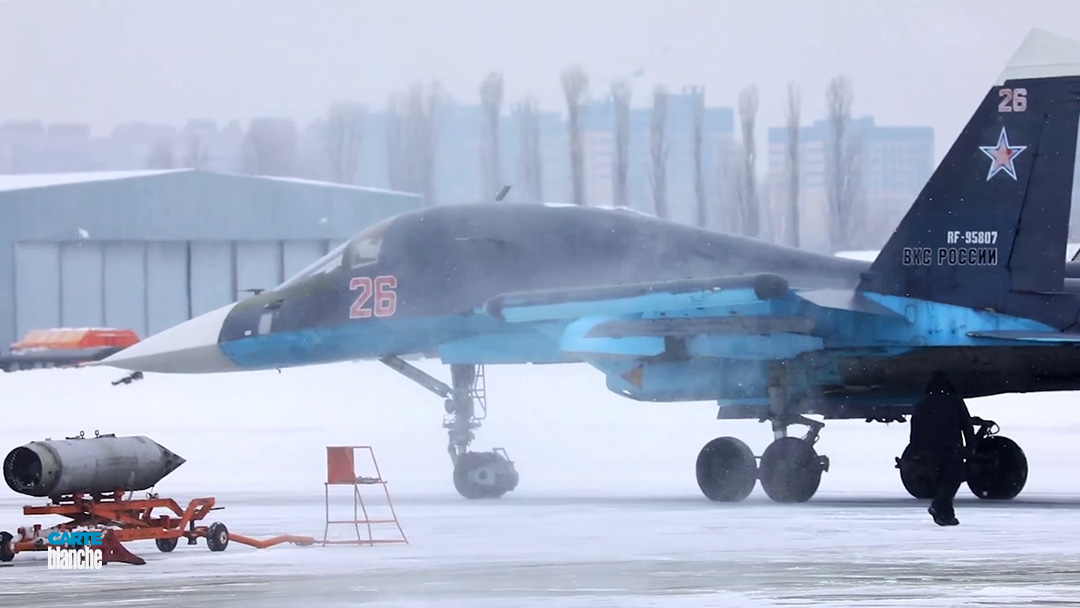
Russian Roulette: Will Russia Invade Ukraine? Fears for ‘Biggest War in Europe Since 1945’
As UK Prime Minister Boris Johnson claims that Russia is about to launch “the biggest war in Europe since 1945”, Carte Blanche tonight asks will Russia really invade the Ukraine or not, and why has the South African government been so quiet about it? SA’s current affairs show Carte Blanche says: “As Russian President Vadimir […]

As UK Prime Minister Boris Johnson claims that Russia is about to launch “the biggest war in Europe since 1945”, Carte Blanche tonight asks will Russia really invade the Ukraine or not, and why has the South African government been so quiet about it?
SA’s current affairs show Carte Blanche says: “As Russian President Vadimir Putin plays Cold War-type brinkmanship games on the borders of Ukraine, global markets and the Rand get the jitters. But why has the South African government had so little to say about its BRICS (Brazil, Russia, India, China, SA) ally continuously threatening a sovereign nation that prizes its hard-won democracy?”
Ukraine’s Ambassador to South Africa, Liubov Abravitova, tells the show: “What makes Russia to feel themselves unsafe? No one is making a build-up on their border.”
Putin claims the West is sowing hysteria in a crude attempt to lure Russia into war after ignoring the Kremlin’s concerns about NATO enlargement after the Cold War.
Abravitova says “the appearance of Ukraine on the map of the NATO doesn’t bring, from my humble opinion, any threat to Russia. NATO is already close to Russia, for many years.”
Tonight’s episode promises to look at both sides of the ever-evolving crisis. Watch Carte Blanche if you’re overseas from Tues | Watch in SA tonight on DStv Now(Find out what’s on Carte Blanche tonight.)
"What makes Russia to feel themselves unsafe? No one is making a build-up on their border," asks Ukraine Ambassador to South Africa, Liubov Abravitova. Join us this Sunday at 7pm on #CarteBlanche as we look at both sides of the ever-evolving #UkraineRussiaCrisis. @MNet pic.twitter.com/G75aMm0jJv
— Carte Blanche (@carteblanchetv) February 19, 2022
Speaking to the BBC, the British PM made his claim that Russia is intent on the biggest war since 1945, and that “all the signs are that the plan has already in some senses begun.” According to British intelligence Russia is encircling Ukraine’s capital Kyiv (Kiev) to launch its invasion.
US experts estimate there are already between 169,000 and 190,000 Russian troops (including revels in eastern Ukraine) on Ukraine’s border with Russia and with Belarus.
Johnson warned that “people need to understand the sheer cost in human life” that a Russian invasion of the Ukraine could entail.
He said the US and Britain would seek to cut off Russian companies’ access to US dollars and British pounds if the Kremlin orders an invasion of Ukraine. “The plan that we are seeing is for something that could be really the biggest war in Europe since 1945 just in terms of sheer scale,” Johnson said.
Reuters Updates on the Russia / Ukraine Situation Include:
- Today (Sunday) the Ukraine suspended operations at one of its seven checkpoints due to heavy shelling. Ukraine believes the shelling is aimed to provoke it, and the West believes the incidents have escalated in the past week as a pretext.
- Russia denies any plans to attack neighbouring Ukraine.
- The Ukraine denies Russian accusations that Kiev could launch an offensive in eastern Ukraine. (Multiple explosions were heard on Sunday in the centre of the separatist-held city of Donetsk in eastern Ukraine, a Reuters witness said; and a loudspeaker in the area asked citizens to exercise caution.)
- Boris Johnson said on Sunday that sanctions “may not be enough to deter an irrational actor and we have to accept at the moment that Vladimir Putin is possibly thinking illogically about this and doesn’t see the disaster ahead”. He said the UK and US would stop Russian companies “trading in pounds and dollars” which would “hit very, very hard”.
- Russia says the assessments of US and British spies on Ukraine can’t be trusted. A Russian representative to the United Nations, Dmitry Polyanskiy, told Sky: “We don’t trust the U.S. and British intelligence, they let us down, the whole world, on many occasions enough to remember weapons of mass destruction in Iraq.”
WATCH Western leaders warn Russia over Ukraine
Ukraine: what would a Russian invasion actually look like? These are the three most likely scenarios:
BY David J Galbreath, University of Bath
Despite suggestions to the contrary from the Kremlin, Ukraine remains surrounded by Russian troops, both along its long border with Russia and from within occupied Crimea. The Russian Federation has deployed land, air and naval forces that give the Kremlin a range of possibilities should it seek to initiate military action.
Not for the first time, Russian forces look set to challenge the sovereignty of Ukraine, and the west appears no closer to knowing what to do about it without risking war between nuclear armed states.
Russia has been laying the ground for military action against Ukraine since 2014, when it seized Crimea and thereby gained a more substantial military foothold to the south. Meanwhile, the ongoing war in Ukraine’s Donbas region allowed Russian security and intelligence units to continue to gauge Ukrainian military and paramilitary operations.
In spring 2021, the Russian Federation ramped up actions against Ukraine, stopping short of actual war. It launched cyber attacks and misinformation campaigns as well as disrupting the energy supply. The Ukrainian Security Service has identified operational and sleeper units from Russia’s Federal Security Service, Foreign Intelligence Service, Military Intelligence and Special Forces operating within its borders.
If military action does occur, there are three likely scenarios for how it would play out.
Scenario 1: decapitation
The first is the decapitation approach. Russian military and security forces would seek to remove the current government and state powers in order to insert replace them with people more favourable to (and owned by) Moscow. Perhaps surprisingly, this would entail keeping on some people who are already working in the Ukrainian state. There are figures who have shown sympathies for and have worked with the Russian Federation.
This scenario would probably entail security and intelligence units on the ground in Ukraine as well as units from the military exercise currently being conducted in Belarus. The greatest concern for Russia in this scenario would be how the Ukrainian military and police would respond. There may also be a significant public backlash against a change of government led from Moscow.
Scenario 2: war in the east
The second possibility is the eastern war approach. Here, Russian forces would seek to reinforce the breakaway regions in the Donbas with arms, supplies and intelligence. These areas would then be used as a springboard to take more Ukrainian territory to more fully cover those areas where ethnic Russians and Russian speaking Ukrainians are located.
Such a manoeuvre could take Russian troops as far as the Dnieper river, which splits the country into east and west. It could also stretch across the coast of the Black Sea all the way to the Moldova border (where another Russian reinforced breakaway region is located).
Such an operation would be supported by military forces stationed in and around the Russian region of Rostov-on-Don, to the east of Ukraine, forces to the south stationed in Crimea and also probably Russian army motor and rifle battalions stationed in the breakaway Transnistria in Moldova.
Scenario 3: full invasion
The final possibility is the full invasion approach. All of those forces mentioned thus far as well as air units located further north would seek to defeat Ukraine militarily. They would use recent experience in combat operations in Syria to defeat any popular insurgency against Russian forces.
This approach would be devastating for the people of Ukraine. Large-scale death tolls would be expected across the Ukrainian military and police forces as well as among local populations adjacent to battles. There would be major flows of refugees to the west of Ukraine and into the bordering states of Poland, Hungary, Romania and Moldova. Such a refugee crisis could be the largest in Europe since the second world war.
Daunting repercussions
It’s important to note that these approaches are not mutually exclusive. They could even occur sequentially should the Kremlin be unsatisfied with the changes it finds in Ukraine or the west.
Regardless of what Russia does, other countries with unsettled disputes over breakaway territories, such as Moldova with Transnistria and Georgia with South Ossetia and Abkhazia, will be watching events nervously. A victory in Ukraine for Russia might well fuel actions against these countries in the future. And if the west fails to respond robustly, even countries like Estonia and Latvia could face threats in the future.
Russia’s military threat against Ukraine has put the west in a difficult position. It has to decide how to deal with a belligerent Russia and how far it should expand its membership to, say, Ukraine or Georgia and beyond. Nor are these predicaments helped by the fact that the United States is more concerned with China, the South China Sea and the status of Taiwan these days than the fate of eastern Europe.
What’s more, the very future of NATO may be on the line if it cannot have a credible response to Ukraine through diplomacy, military assistance and maybe even military response. Such a loss of credibility would be a major win for Russia, which sees NATO as a threat to its own national security and global strategy to regain power. In other words, the significance of the situation in Ukraine cannot be underestimated.![]()
David J Galbreath, Professor of International Security, University of Bath
This article is republished from The Conversation under a Creative Commons license. Read the original article.
